Sep 07, 2024
Who Is The Party Scientist? Meet the Expert on the Science of Joy and Human Connection

Before he became The Party Scientist, he was Jacques W. Martiquet, a student at the University of British Columbia studying public health and pharmaceutical development while volunteering as an emergency medic for events in Vancouver.
His career path may have shifted from health and medicine to meetings and events, but Martiquet’s ultimate goal in life held steady: Help people feel healthy and happy. His time as a volunteer emergency medic made him realize there was another way—maybe even a better way—he could do that.
“I was with my medical partner driving a golf cart around at this festival—a 60,000-person festival—when we got a call about an unconscious person in the campground,” he recalled. “I’m running through the campground with my partner trying to find this person—this kid, pretty much—and we enter this opening of tents and see a bunch of people playing drinking games, and then there’s just one kid facedown in the middle of them all, and I just remember thinking, ‘What the hell are all of you doing? Do you not care about each other?’
“We rushed him back to the main medical tent and he survived, and that’s what made me want to change these social norms,” Martiquet said. “I saved a bunch of young people's lives and had these experiences of reviving and supporting people who had succumbed to these toxic social norms…and I realized there was a much better way to gather and to facilitate the joy of being alive. That's when I started to throw sober parties.”
That’s when The Party Scientist was born.
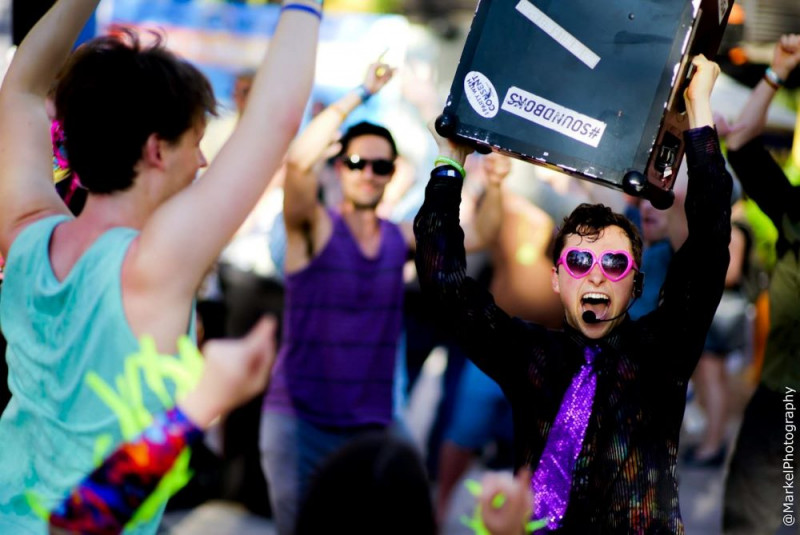
The Creation of 'Sober Parties'
Martiquet set out to design gatherings that maximized a sense of community and the physical and mental health benefits of genuine connection. It didn’t take him long to figure out all he needed to accomplish this was positive energy and a giant speaker.
“I traveled Europe alone with one of these really loud speakers and I would set it up in public, and random people would start dancing wherever I was,” Martiquet said. “I would start these parades of like 300 people. No one knew who I was, but they saw me and they saw people having fun, so these big parades would form and I developed this confidence and this system for reducing people’s self-consciousness, helping them access that joy we have inside that we don’t often get permission to let out.”
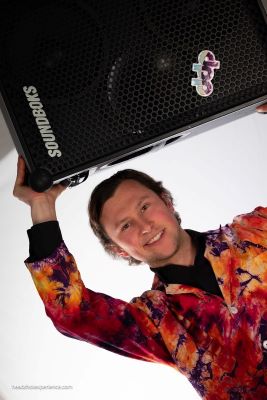
Martiquet started calling these spontaneous gatherings “sober parties.” To his surprise, they went viral on social media and Martiquet found himself speaking at festivals, teaching people how to have fun without substances.
“You asked me when I became The Party Scientist? That’s when,” Martiquet said. “I became The Party Scientist—this confident, charismatic social engineer—when I traveled Europe with a speaker.”
It may have looked like Martiquet wasn’t doing anything but throwing sober parties in the street, but in reality he was showing people how gatherings serve an important purpose for our mental health and connection to our community.
Martiquet figured out how to fully leverage the potential of gatherings by “socially engineering” them to maximize the attendee experience and help them feel energized, connected and safe. Now, as The Party Scientist, his goal is to help meeting and event planners do the same.
“The Party Scientist goes so beyond just how to lead a dance party,” Martiquet said. “It used to be that, and now it's like, ‘What are the mindsets and social skills and psychological frameworks needed to create this natural joy with others?’ And so, that's the science of interpersonal joy, and human connection is this abundant source of joy. It's one of the easiest ways to create this feeling of joy in our bodies. So now, [my mindset has] shifted much more to, ‘How can I help people access this infinite reservoir of joy through human connection?’”
If you ask The Party Scientist, dancing is the answer.
[Related: Mocktails Are Gaining Popularity. Will Meetings and Events Catch the Trend?]
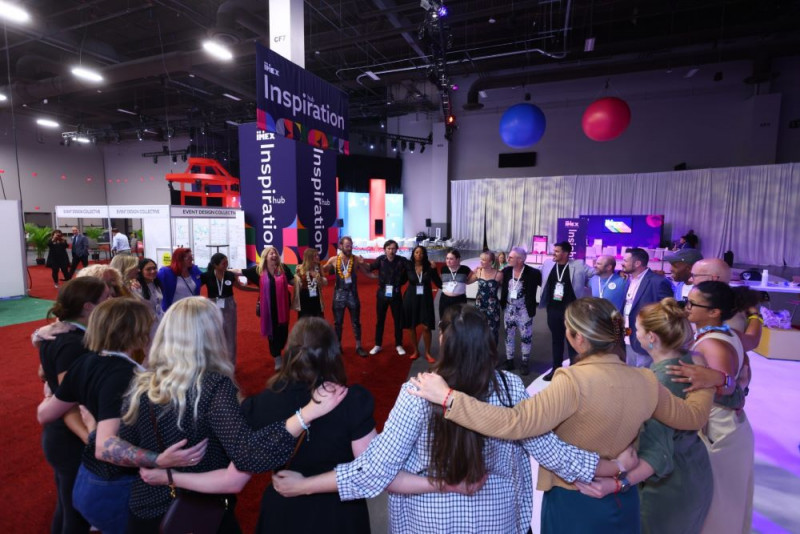
Dance Dance Resolution: How Movement Creates Joy
It’s unfortunate, but it’s the truth. Society has deemed it “not normal” to let loose and dance at social gatherings unless you have a drink in your hand. Martiquet’s message isn’t that alcohol is the enemy, it’s that alcohol isn’t always the answer.
“There’s a real problem with how we celebrate at gatherings, and it’s a stigma on emotional positivity. People get skeptical of that,” Martiquet said. “I’m on Earth to reframe this ecstatic positivity as the best antidepressant—and that’s not just my opinion.”
The BMJ, a peer-reviewed medical journal, published a study earlier this year about the effect of exercise for depression. Data gathered from more than 200 studies with 14,170 participants revealed that not only does dancing show the largest reductions in depression symptoms out of several exercises, but it also has the potential to treat depression more so than selective serotonin reuptake inhibitor (SSRIs) and cognitive behavioral therapy.

“That’s just evidence. Compare any other behavioral intervention for depression to dancing and it beats them all—other forms of exercise, walking, mindfulness,” Martiquet said. “Dancing is a better treatment for depression than all of these things, and that’s one piece of why The Party Scientist exists.
“There’s this antidepressant that we don’t leverage enough. We don’t incorporate it into our gatherings because it’s scary and risky and it requires social engineering,” he continued. “People don’t know how to socially engineer things unless there’s alcohol and then suddenly everyone’s free to dance and be more expressive, right? It just becomes difficult to reach amazing states of joy, so the question we should be asking is, ‘How can we give more of this antidepressant at our events and see how that benefits everything we care about?’”
In Martiquet’s eyes, dancing isn’t just a way to move your body, it’s a tool that can make you a happier version of yourself, and increased levels of happiness improve intellectual and social intelligence, decrease stress levels and boost self-confidence.
“So, really, all our KPIs are facilitated by this feeling in the body of joy, right?” Martiquet said with a matter-of-factly smile. “That’s the second piece of why I’m on this Earth: To shift social norms, to create an alternative version of gathering where we don’t have to self-sabotage and end up reducing our physical energy and social battery the next day at a conference. I’m here to immerse people in the experience of immeasurable joy.”
The Next Chapter
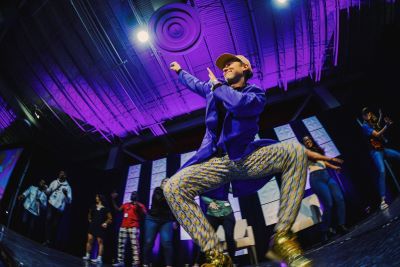
The Party Scientist never stops, and Martiquet already knows what’s next: Vyving, or “the act of sharing joy with others to music, with the goal of flooding the body with healthy endogenous neurochemicals.”
“It’s quite an ambitious project,” he said. “Essentially, I want to be able to replicate what I do without being in the room. I want to be able to scale this practice to share joy through a system, and that’s what Vyving is. Really, what I’m doing during all my sessions is getting people to try vyve together, so what’s next for me is figuring out a way for vyving to happen without my physical presence.”
Ultimately, Martiquet wants to put the power in the event organizers’ hands and give them the tools they need to create an environment where their attendees can “vyve” without The Party Scientist leading the charge.
[Related: The Z: 6 Tips to Make Networking Less Awkward]
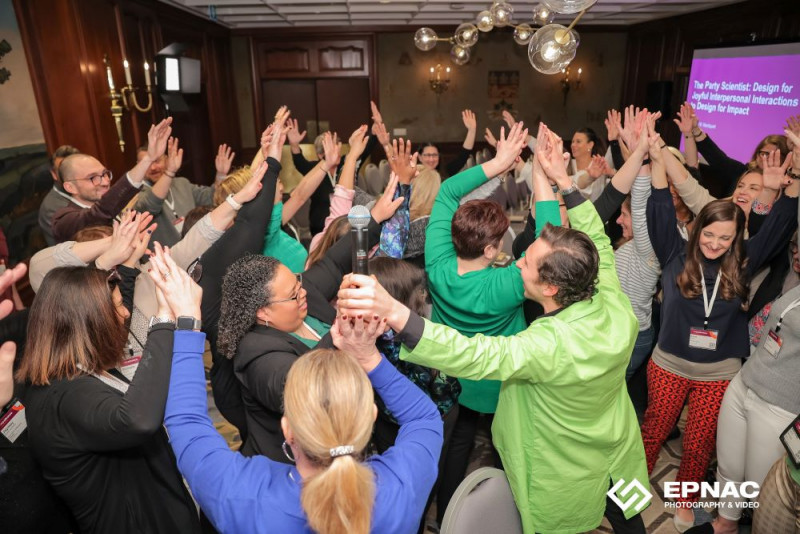
Planning With The Party Scientist
The Party Scientist’s journey into the meetings and events industry started at a Lush Cosmetics event in Toronto where Martiquet led a one-hour experience designed to build community, promote positivity and boost levels of joy, “and everyone loved it.”
When the positive reviews started rolling in, Martiquet’s connection at Lush encouraged him to consider the possibility of being a speaker and introduced Martiquet to the world of MPI.
“Back when the meetings industry started to open up again, I did a webinar with MPI, and after it went well, I ended up giving a session at [MPI’s World Education Congress],” Martiquet said. “WEC is where I got validated. It’s where I saw that I could actually be a speaker, that I had something important to say. People were participating, the MPI team member in the room told me how powerful it was, the CEO of IMEX gave me a testimonial…That’s when I realized the experiences that I have to offer are valuable.”

Since then, Martiquet has welcomed first-time attendees to IMEX America, led workshops about the science of joy on multiple tradeshow floors and worked with clients including Lululemon, Envision Festival, Shambhala Music Festival, Capilano University and more to show crowds what’s possible when we let go of our fear of being judged, let loose to good music and authentically connect with the people around us.
“The greatest value I can offer any gathering is an opening ceremony that changes the social norms so that everyone feels safe, energized and connected,” Martiquet said. “We have this opportunity at the beginning of a gathering to shift people’s script. We have the ability to change how they feel but it takes the right science-based approach, and my method is all about neurotransmitters. It’s based on science and what’s worked hundreds of times in the past.”
When people move in synchrony it raises endorphins in our bodies, and endorphins are a vital component of social bonding and connection. Instead of kicking off events with long-winded speeches and keynote speakers, The Party Scientist turns to science to show meeting planners why they should take a different approach—but of course, he had to test that approach first.
Martiquet traveled to Atlantic City, New Jersey, to lead his first opening ceremony at an MPI New Jersey Chapter event and take a risk trying something new in front of an unexpecting audience. It ended up being worth the reward.
“The vibe of the conference was different afterward. I could approach anyone and talk to anyone, and this validated the concept of the opening ceremony,” Martiquet said. “People were more relaxed, more open to connecting with one another, and I felt partially responsible for that.”
He was, however, entirely responsible for the 200-person conga line that followed.
Read this next: Be You Disco Brings Teams Together Through Dance, Music and Mindfulness